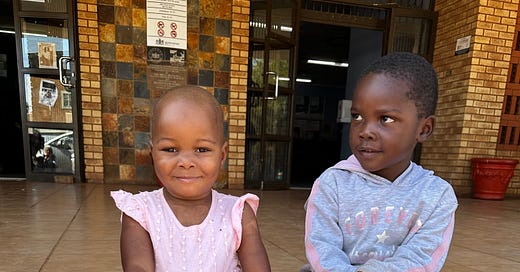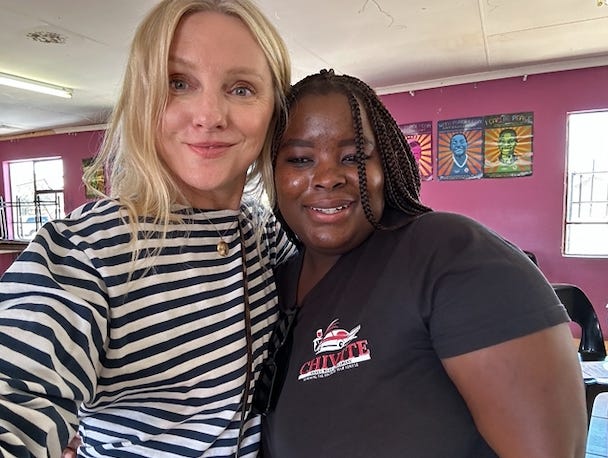Seeing (RED) in South Africa
Adventures in education, healthcare and hope in South Africa's ongoing fight against HIV. First stop, Johannesburg...
I’m on a plane from Johannesburg to Cape Town as I write this after a “hectic” (common slang here, and perfectly descriptive) two days touring health facilities and care organizations with (RED) and The Global Fund. I’ve known the folks at (RED) for a while, after meeting Bono (who founded (RED) with Bobby Shriver in 2005) and Ali Hewson through their former sustainable fashion brand, Edun, over a decade ago. I’ve recently been honored – actually, I am beside myself - to join (RED) as chair of their Creative Council. Ooh baby, we’re gonna rev it up.
In the United States, we are fortunate to largely view HIV in the rear mirror. But while it has receded in our memories, in Africa, it is far from over. South Africa particularly carries the largest burden of HIV in the world: it accounts for almost 20% of the global population who are living with the virus, and 14% of infections. It’s also the leading cause of death, over heart disease, stroke, violence…name anything else. It’s stunning how common HIV is in the vernacular here – people talk about it as regularly as we in the US talked about Covid… during Covid. Which is why the Global Fund and the South African government have committed nearly $2 billion to the HIV fight, of which $94 million has come from (RED).
There’s a common trope people (mostly white ones) tend to fall into after their first visit to Africa. You know it: “It changed me,” “I’ll never be the same.” (My favorite is when Americans suddenly become British: “When I was in Ahf-rica…”). Now, I don’t doubt the in-the-moment sincerity - well, sometimes - but it’s rather much broader than “you.” Visiting in-need parts of the continent, you, dear important you, are reminded of your position in this teeming universe, your little cell in the circulatory system of the global population, and yes, your great luck.
There is no greater example of this than a visit to the Center for Positive Care, a Johannesburg clinic providing health, testing and childcare services to sex workers. Yes, childcare. Sex workers, profoundly lacking options (due to stigma in the community), can leave their children at the clinic while they go out to work. And there’s a little room in there, with a doll and a small table with colored blocks. But it’s profoundly depressing.
Because this is brutal. Sex work is still illegal in South Africa (despite a slow-moving campaign, currently with parliament, to legalize it), and no rah-rah talk of women’s empowerment or agency gives these women either. The support of organizations like CPC (funded by the Global Fund) are the best they’ve got.
We sat with around 20 sex workers at a CPC safe space and asked them about their challenges. An older woman, Samantha, shot her hand up: “The police. Even in the daytime, if I am not doing business, they will arrest me. Maybe they keep us for five days. And they’re beating us. I say, ‘Why are you arresting us? I am not a criminal.’ They say, ‘You are a bitch, you are a sex worker.’ Then they take you to a cell. I have been raped two times by officers without a condom. We are not free.” She added they are routinely, “tear gassed, and pepper sprayed.”
Although the CPC is engaging in a “sensitization” program to educate the police in the rights of these women, the officers have zero accountability – to them, these women are both dirty and disposable. “We are living a second life,” another woman observed, “Not a real life.”
Further afield, the work seems equally insurmountable. We visited the KT Motubatse Health Center in Pretoria, in an area where people were foraging at the local dump. There must have been 100 mothers and babies waiting for a checkup, sitting patiently for hours. Each woman held her baby in one arm and health records in another – because there is nothing resembling digitization. The team showed us a presentation of their staff and resources: for a clinic servicing a region of 95,000 people, they had one doctor. One. But seven security guards.
Motubatse had more nurses, both on site and working around the region in mobile clinics, but the lack of resources borders on chronic. When I asked what would benefit them most, an administrator tapped me and said, “Can you get us an ultrasound machine?” In 2023, the clinic is still doing ultrasounds with cone instruments. You immediately google, “Cost of ultrasound machine,” thinking surely, we can help provide one? But then you need a trained operator. And it’s hard to find doctors in this area because they are so poorly paid. The list goes on and on. What you do learn is that you are extremely naïve.
Our last visit of the day, to Childline Gauteng, was something of a silver lining. Progressive and energized, Childline has branches around the country and big “come hang with us” energy. Their ‘My Journey’ program, supported by the Global Fund, works to keep kids in school and find them jobs while reducing HIV transmission and gender violence. And the place looks fun, like a real community. There are a bunch of young men (clinical finding: skinny jeans are universal) receiving sex and gender education but also free haircuts and help setting up bank accounts. There’s a group of women meditating, while others make intricate beaded bracelets. There’s a lot of cackling and mischief and kids coming over after school.
A graduate of the program is a young woman called Tsakane Baloyi. One of her best friends was shot in front of her, and the trauma resulted in depression and suicidal thoughts. She came to Childline in pieces. Now Tsakane is an entrepreneur, running Chivite, her own panel beating and respray company with six employees. She’s got hustle in her bones – giving out her business card and planning expansion. She could be a motivational coach.
So, guys, if you need some work done on your car in Pretoria, Tsakane’s your girl.
More to come – brilliant teenage girls, a female condom tutorial, me being an absolutely shit TikTok dancer – in my next dispatch from Cape Town.










Thank you for this powerful and moving story. I know you brought a shining light of compassion and love with you, I can see it in their faces
Hey, stories like this one makes me grateful that I follow you. Thank you.